- Home
- Hugo Hamilton
Sad Bastard Page 2
Sad Bastard Read online
Page 2
How they weren’t spotted by the harbour police was a miracle.
Jesus Christ, Gussy said, and within minutes they were back on the pier again. Jimmy getting sick into an empty Pringles tin, as though it had been specially provided for seasickness. Hanging over the blue railings like a puking pilgrim, retching up his ancestors.
Gussy made a run for it. But Jimmy didn’t see the point. He found himself a sheltered place along the pier and sat down. Watched the swell of the tide lapping against the steps in the harbour. Tried to focus on the swirling red beam of the lighthouse for a while until he laid his head down on the cool granite stone and fell asleep. The sea was calm. A heron stood on the steps close by, like a silent witness.
Around that time, two men were driving along the coast road towards the harbour in a red van. The man at the wheel was the skipper of the Lolita, a chubby, forty-year-old man by the name of Martin Davis. Bald with a full-blown, bushy brown beard, he carried an extensive bit of freight out front, like a beanbag paunch hanging over the belt of his trousers. He was convinced that women liked a big belly with soft black fleece. It could be massaged and slapped. A convex sign of prosperity, fun and formidable appetite.
In the passenger seat, with his legs stretched out, sat a wiry man by the name of Mongi O Doherty who interpreted the bulging shape of the skipper’s stomach as a sign of weakness. The exploitable, soft underbelly of a man devoted to pleasure.
Mongi was younger than the skipper, with a shaven head and a different temperament entirely. He saw pleasure as something you stole from others. He had been brought up in an environment where pleasure was something you grabbed while you had the chance, something that was normally associated with another person experiencing pain and dispossession.
As everyone knew, pain and pleasure were the same thing, only on opposite ends of the scale. Understanding this was the basis of capitalism; if you didn’t grasp the barometer of human longing, then you were fucked as far as making money was concerned. At the point of a knife, or a dirty needle, it was surprising, for example, how quickly people despised their own material belongings. Moneylending and drug sales had also proved this point beyond any doubt. And a gun, well that was the true revolution. At the point of a gun, you had people begging you to take their money. Fear and pain altered everything.
With these elementary rules of commerce, Mongi had developed true leadership qualities.
The name Mongi had various sources. One of them is thought to have had something to do with his protruding teeth. People recognised an uncomfortable combination of the benign Bee Gees smile and a savage horse-bite of yellow neglect. His smile was a kuru grin of cannibal revenge, and his laughter produced a kind of echo over the city of Dublin. The hollow laugh! The millennial laugh of progress. The great capitalist laugh of eternal growth and incessant innovation.
It was rumoured that Mongi had once bitten a Garda in the face. Leading people to believe that the origins of his name had more to do with the style of the mongoose, darting in and out rapidly to bite its prey. But the irony only fully ripened when you discovered that his nickname Mongi actually came from the word mangach in the Irish language, meaning toothless. His real name was Richard O Doherty.
To hell with fishing, he was saying to his new associate, Martin Davis. Fishing had become an extinguished way of life belonging to the last century.
You’re dead right, skipper Martin Davis agreed.
Everywhere around the Irish coast had been fished to bejaysus. Mackerel-crowded seas, my arse. You had to compete with a massive fleet. Every factory ship in Europe was out there grabbing the same statistical slice of fish pie, fighting like a bunch of cut-throat pirates over the Atlantic fish-finger quota. Nobody would eat the glow-in-the-dark radioactive plaice from the Irish Sea any more. And what was the point in braving all kinds of inclement conditions, getting your hands raw like the Man of Aran and risking your life for a bit of stinking turbot. Every piece of fresh cod was marked and numbered on a radar screen; caught, gang-raped, cooked and consumed before you had a chance to slip the mooring.
Fishing is a cold and smelly business, Mongi said gravely.
Don’t be talking, Martin Davis said, a grimace of disgust on his face.
You probably spent more money on fucking talcum powder than you earned on the catch.
Old Spice!
The skipper couldn’t agree more. He was nodding like a rear-window travel dog. I hate the fish trade, he was saying. I hate all those biblical innuendoes. Casting out nets. Gathering souls and all that stuff. Look, Mongi – I know what you’re saying here. I’ve seen the movie.
But Mongi continued to place his own philosophical spin on the new dawn of opportunity. He was putting forward a vision for his people. The Irish were through with subsistence economics. He was the right man to be talking, with a name like Mongi. As they sped towards the harbour in the skipper’s new van, he sounded like a fishmonger, glorifying the new enterprise of loaves and fishes. Sudden abundance! Economic miracles! All that had changed was the nature of the catch.
Wet-backs!
Fish-backs!
Wet-backs and fish-backs, Mongi echoed with his hollow cackle.
They could see the lights of the harbour below them. Two piers reaching out into the sea, embracing the visitor. Grabbing trade from the outside world.
Can you believe it? Mongi said. People paying money to get into Ireland. Remember when all we ever did was send out emigrants through that harbour. Every story ended with a man or a woman taking the boat to England. Remember the sign on the old mail boat as you walked across the gangplank: Mind Your Step! The last word of advice to the Irish exile.
Who woulda thought? Skipper echoed.
That’s the new frontier, Mongi pointed, lighting up a cheroot in celebration.
If I woulda-hada known it was going to be like this, I woulda-never-hada busted my balls on the fishing for so long, the skipper said.
Fucking frontier is what I’m saying.
Mongi liked to repeat catchphrases to great literary effect. It gave things profundity. Added a cheap metaphysical lacquer to his words. Made him an innovator. He liked to remind people that there was such a thing as original thought, and it came from him. Out there in the future, the face of Mongi O Doherty would some day appear on the Ecu banknote.
Without me, you’d be nowhere, captain.
Martin Davis kept his humble mouth shut; just nodded in compliance. They had gone through all of this before. But since there was so much money involved, perhaps it was necessary to define the roles again. Who was the boss, in other words. Who was the creative genius behind this new enterprise.
Without me and my European connections, you’d still have fish scales on your mickey, Mongi continued. Without me, you’d be out there near Rockall with a floppy herring in your hand, like some prehistoric islandman. Spanking the mackerel! Jesus, Mongi laughed. No wonder people in Ireland hate fish.
Bud asail, the skipper muttered in Gaelic through his beard. The peasant revenge.
Mongi’s grasp of the Irish language wasn’t so hot. But he knew enough to understand that the word bud referred to the male prosthetic supplement. Mickey. Mackerel. He looked around angrily, demanding to know what the skipper was unhappy about. He had left fishing behind and was making serious money. All he had to do was bring in a consignment of illegal immigrants, hand over the money to Mongi, take his share and then go and get bricked out of his head. Eat food, get drunk and get laid for a few weeks until the next lot was to be brought in.
It was the new frontier all right. The Lolita rose and fell gently on the tide, with its human cargo of East Europeans still below deck, waiting to disembark. They were stiff from sitting on the cramped bunks of the two small cabins, looking out through a porthole at the bilge pump gushing rhythmically through the side of the next boat. Some of them were pale with seasickness and still vo
miting into plastic bags. They couldn’t wait to see Ireland. They had paid good money to get this far.
The journey was not over yet, though, and according to plan they would have to spend some more time in the back of the van, until the skipper saw fit to release them on to the streets of the capital. Drop them at some labour exchange. Or just show them where to get the 46A into town.
The van reversed along the quay and the men got out. Martin Davis did what all truck drivers and van drivers do at this point; he adjusted his trousers and put everything back in place. He hopped out of the cab, stood with his legs apart and briefly performed that obligatory freedom jiggle, giving his trousers a little shake and pulling them up over his hips again before moving on. Then he followed Mongi and stepped on board the Lolita like an immigration officer.
For Jesus sake, Mongi hissed through his horse-teeth as he heard the singing below deck. The immigrants had been in those cabins too long and were trying to keep their spirits up, dancing and singing to combat poverty and loneliness and homesickness.
They’re as bad as the Irish, Mongi roared. Can’t go anywhere without starting a party. Drinking plum brandy and enjoying themselves. Singing sad songs.
Martin Davis hammered his fist on the door of the cabin and everything fell silent. Then he rooted under a seat and handed Mongi a red sportsbag.
Jesus, man. I said Irish or sterling!
What could I do? the skipper pleaded. I could hardly send them back.
What am I supposed to do with this stuff? Mongi held up a bundle of dollars, threw it back into the bag and zipped it up. It’s awkward.
What was far more awkward was the presence of Tommy Nolan on the pier. He was on to this reverse emigration business. Already he had witnessed one consignment arriving a few weeks back. He had gone to the harbour after the pub and concealed himself on the quay, behind a stack of fish boxes and a mound of damaged blue nets. Behind him some tyres and ropes to sit on; and the smell of diesel and paint and piss all round. The lighting was poor and some of the lamps on the pier were missing. Tommy kept his eye on the trawlers shifting on the tide. Listening to the wood squeaking and groaning, so that he nearly fell asleep himself.
Until he saw the van arriving and the men getting out. Exhaust fumes drifting towards him.
After a while, Mongi came up on deck again carrying the holdall bag. Stepped off the boat and threw the bag into the front of the van and shut the door again. He stood around, smoking. The smell of cigar smoke blending with the smell of exhaust as he began to pace up and down beside the van.
Fuck this, Mongi muttered impatiently and jumped back on to the boat, down below to speed up the immigration procedure. He was demanding expediency that nobody could ever get used to. His people had been brought up on a spiritual sense of hope that ran counter to crass, wash-and-go, Euro-efficiency. They had lived on the imagination for so long that they didn’t know how to grasp the material urgency of the moment. They still thrived on the accident, the casual diversion, the gift of surprise. The twist out of nowhere!
At this precise moment, Jimmy Coyne walked down the quay. Refreshed from his sleep, he walked straight towards the red van as though he had just parked it there himself. His face was disfigured with the imprint of granite on his cheek. His mind was disfigured with drink and sleep. But he seemed to walk straight with a great air of purpose. Assumed that the new van on the pier had been placed there for him, with the engine running and all.
People were driving all kinds of new vehicles in Dublin these days. He opened the door of the cab and got in. Didn’t even notice the holdall bag on the passenger seat and just started playing with the clutch and grinning to himself like a halfwit, getting ready to drive away when the door opened.
Beside him on the pier stood Tommy Nolan, mouthing at him like a guardian angel, begging him to stop. This is unconstitutional, he was trying to point out, with saliva streaming from his mouth. Trouble is close behind. Think about this – get out and walk away slowly before it becomes irreversible.
Jimmy pushed Tommy away. Slammed the door and got ready to drive.
In the meantime, Mongi had come up on deck with Martin Davis behind him. The immigrants with their bags down below at the bottom of the steps, eagerly waiting to be told to come up and breathe the misty night air. Mongi leaped on to the pier in disbelief and grabbed Tommy Nolan by the neck.
You dirtbird bastard! Mongi shouted, dragging him over to the edge of the pier. I fucking warned you.
Jimmy Coyne considered hiding, or escaping out the far door of the van. He looked out and saw Mongi turning around. Made eye contact with him, just before the van leaped forward with a terrible gear-grinding sound of agony.
Mongi was left standing on the pier, looking into the harbour. Then he tried to run after the van, tripping over a rusted brown mooring ring as he went. But Jimmy had managed to put the van in second gear and was already driving away up the hill towards the main road.
This was Black Monday for Mongi O Doherty. This was share freefall. He looked into the harbour and then back up to the main road where the van now disappeared. Nothing on the pain/pleasure scale was more agonising than being ripped off due to your own carelessness. This was like biting your own tongue. This was like catching your foreskin in the zip. Like mistaking your own mickey for a mackerel.
Coyne made another phone call before he went to bed that night. It was something that had to be done with systematic dedication. Some things could not be dropped and forgotten. No way! Terrorism was an exact science that had to be consistent, unrelenting.
Killjoy, there is something I have to tell you, Coyne said into the phone as soon as it was answered.
If you don’t stop this I’ll call the Guards! I’ll get this call traced.
Killjoy, you stupid bastard. You intransigent fucking moron. I hope that taught you a lesson. You’ll live to regret the day. Killjoy, I hope they give you a pig’s heart.
Tommy Nolan’s body had no obvious marks when it was taken from the water the following morning. There was a lot of activity around the harbour, with blue lights flashing across the side of yachts and reflected in portholes. A sense of shock had already spread through the borough. Shopkeepers were talking. People stopped their cars along the main road overlooking the seafront. A crowd had gathered behind the yellow crime scene tape, looking down into the harbour. Into the gap between the trawlers and the pier where the debris normally collected into a compilation of styrofoam boxes, plastic litre bottles of Bulmers and Sprite, bits of saturated wood and usually a condom, floating in a greasy film of rainbow coloured diesel.
Tommy’s body was discovered by one of the fishermen. The skipper of the Lolita, Martin Davis. Sergeant Corrigan from the local Garda station took a statement. Apart from some rope burn marks around Tommy’s chest and a single bruise on the head which might also have occurred when he fell into the water, there was nothing to indicate foul play as such. These marks could have been consistent with a fall across the mooring ropes, and while the state pathologist was still going through his examination, the whole thing was explained as a tragedy. Gardai were of the opinion that Tommy Nolan might have been knocked unconscious by a fall against the hull of a boat after which he had become entangled in the mooring ropes. They were keeping an open mind – waiting for witnesses to come forward.
Coyne was down at the harbour himself that morning. As it happened, he was half keeping an eye out for Tommy Nolan and only became aware of his death some time later. Coyne was wandering around the area as though his life was one big Bloomsday, getting in touch with the real world, discovering all the extraneous, non-essential details he had been deprived of while working with the Gardai. Like water slapping against the steps. The echoes of the harbour. The sheen of sunlight on the surface of the water and the sound of bells everywhere, warped on the breeze. Coiling like oval rings across the tide.
He saw Garda
activity on the far side of the harbour and went over. Stood on the edge of the crowd and finally heard the news. He started blaming himself immediately, spiralling into another bout of guilt and self-effacing torment. He should have listened to Tommy while he had the chance. He had failed him. A further instance of Coyne’s inability to deal with the world.
Jimmy Coyne and Gus Mangan were arrested just before lunchtime.
Coyne received a call from Carmel in the early afternoon. There was a touch of bitterness in her voice that he had never heard before. A plaintive tone. As though all of this was Coyne’s fault. As though he had instructed Jimmy to create havoc in order to provoke her. Coyne was doing all of this on purpose.
You better go down and straighten things out, she said.
It was no surprise that Jimmy had ended up in some kind of trouble. He was starting to drift. And Coyne had no way of being firm with him. Jimmy often stayed out all night. The eldest son of a broken home, at liberty to come and go as he pleased. Whenever Coyne’s atrocious cooking got too much for him, he went home for a meal in the family home with Carmel. Barely nineteen and in custody already.
Leave it to me, Coyne reassured her. He would have a word with the lads.
Coyne knew most of the Gardai at the local station. He had met them at one point or another in the course of his work, but he hated the humiliation of having to intercede on behalf of his own son. The worst thing was having to sit on the public bench. Coyne the temporary off-duty Garda, robbed of his status and told to sit and wait. The ignominy of it. Instead of ushering him straight into the main office, a Ban-Garda listened to him wearily at the hatch, ignored everything he said and told him to take a seat on the public bench.

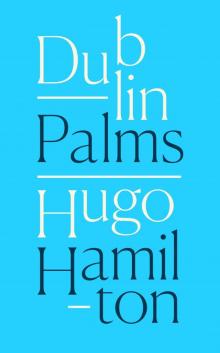 Dublin Palms
Dublin Palms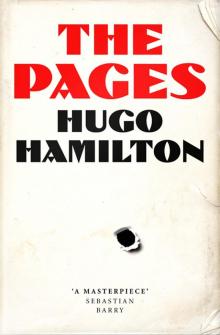 The Pages
The Pages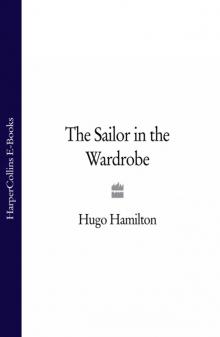 The Sailor in the Wardrobe
The Sailor in the Wardrobe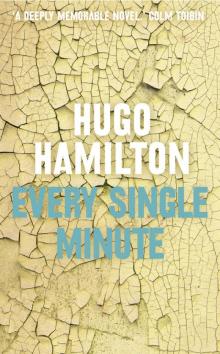 Every Single Minute
Every Single Minute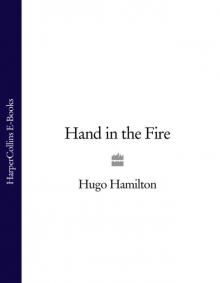 Hand in the Fire
Hand in the Fire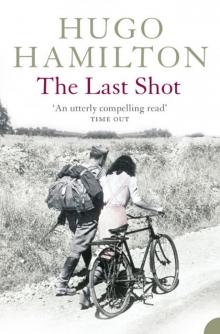 The Last Shot
The Last Shot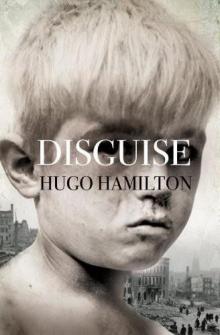 Disguise
Disguise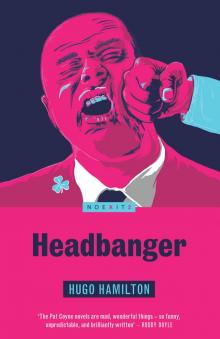 Headbanger
Headbanger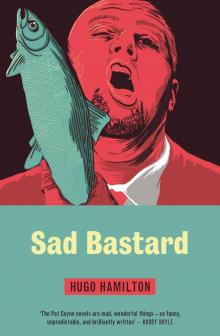 Sad Bastard
Sad Bastard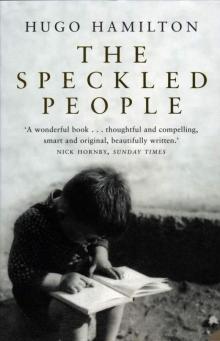 The Speckled People
The Speckled People